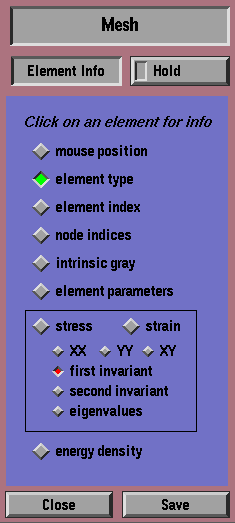OOF: Finite Element Analysis of Microstructures
Next: Node Info Dashboard Up: The Dashboards Previous: Color Dashboard Contents
Element Info Dashboard
When the Element Info Dashboard is open, clicking the mouse on an element in the image prints information about the element to the Message Window. When the mouse is over the Drawing Area the cursor changes to a question mark. The element being queried is under the dot at the bottom of the question mark.
The check boxes in the Dashboard determine what information is printed.
- mouse position
- The coordinates of the mouse in physical units.
- element type
- The type of element, as described in Chapter
4.
- element index
- The index of the element. Each element has a
unique integer index, which can be used to identify it in the output
files created by the /output/individual commands (Section
3.32). Note that the element index can change
if the grid is modified and then equilibrated!
- node indices
- The indices of the nodes at the corners of the
elements. These indices may be used in the command /output/node, for example. They are also used internally in the
.goof file.
- intrinsic gray
- The gray value of the element, as described in
Chapter 4.
- element parameters
- Again, see
Chapter 4. These are the arguments to the function
that was used to create the element.
- stress and strain
- The stress and/or strain in the
element. Which components of stress and strain are printed depend
on the settings of the smaller check boxes below. Note that strain can
be queried even in a Stress Drawer, and vice versa.
- energy density
- The elastic energy density in the element.
The check boxes determining which components of stress and strain are printed are:
- components
- The Cartesian components in the screen's
coordinate system.
- invariants
- The first, second, and third
invariants, as described in Section 5.1.
- eigenvalues
- The eigenvalues, as well as their orientations.
Orientations are either a single number or a pair in square brackets.
The pair
 is the standard representation of an angle
on the unit sphere; i.e,
is the standard representation of an angle
on the unit sphere; i.e,  is the declination from the
is the declination from the
 axis in degrees, and
axis in degrees, and  is the rotation about the
is the rotation about the  axis, as
measured counterclockwise from the
axis, as
measured counterclockwise from the  axis. If
axis. If  , then
only
, then
only  is given.
is given.
Next: Node Info Dashboard Up: The Dashboards Previous: Color Dashboard Contents /* Send mail to the OOF Team *//* Go to the OOF Home Page */
